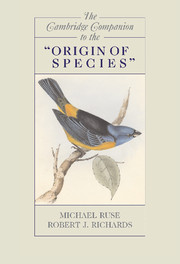Book contents
- Frontmatter
- Foreword
- Introduction
- 1 The Origin of the Origin
- 2 Darwin’s Analogy between Artificial and Natural Selection in the Origin of Species
- 3 Variation and Inheritance
- 4 Darwin’s Theory of Natural Selection and Its Moral Purpose
- 5 Originating Species: Darwin on the Species Problem
- 6 Darwin’s Keystone: The Principle of Divergence
- 7 Darwin’s Difficulties
- 8 Darwin’s Geology and Perspective on the Fossil Record
- 9 Geographical Distribution in the Origin of Species
- 10 Classification in Darwin’s Origin
- 11 Embryology and Morphology
- 12 Darwin’s Botany in the Origin of Species
- 13 The Rhetoric of the Origin of Species
- 14 “Laws impressed on matter by the Creator”? The Origin and the Question of Religion
- 15 Lineal Descendants: The Origin’s Literary Progeny
- 16 The Origin and Political Thought: From Liberalism to Marxism
- 17 The Origin and Philosophy
- 18 The Origin of Species as a Book
- Bibliography
- Index
7 - Darwin’s Difficulties
Published online by Cambridge University Press: 28 January 2009
- Frontmatter
- Foreword
- Introduction
- 1 The Origin of the Origin
- 2 Darwin’s Analogy between Artificial and Natural Selection in the Origin of Species
- 3 Variation and Inheritance
- 4 Darwin’s Theory of Natural Selection and Its Moral Purpose
- 5 Originating Species: Darwin on the Species Problem
- 6 Darwin’s Keystone: The Principle of Divergence
- 7 Darwin’s Difficulties
- 8 Darwin’s Geology and Perspective on the Fossil Record
- 9 Geographical Distribution in the Origin of Species
- 10 Classification in Darwin’s Origin
- 11 Embryology and Morphology
- 12 Darwin’s Botany in the Origin of Species
- 13 The Rhetoric of the Origin of Species
- 14 “Laws impressed on matter by the Creator”? The Origin and the Question of Religion
- 15 Lineal Descendants: The Origin’s Literary Progeny
- 16 The Origin and Political Thought: From Liberalism to Marxism
- 17 The Origin and Philosophy
- 18 The Origin of Species as a Book
- Bibliography
- Index
Summary
Chapters 6 and 7, on “Difficulties on Theory” and “Instinct,” are the fulcrum of Darwin’s Origin of Species. They come at the center of the work, after the first five chapters that explicate the theory of natural selection and outline the causes and effects of the mysterious laws of variation on which Darwin’s argument for natural selection depends. These two chapters sustain the narrative drive that Darwin had been building through the first five chapters and introduce new scientific and emotional dimensions, particularly in his treatment of the theory’s larger implications for the religious context in which he was writing.
“Difficulties on Theory” and “Instinct” take on two classes of what Darwin describes as “a crowd of difficulties [that] will have occurred to the reader … [l]ong before having arrived at this part of my work” (Origin, 171). The first class of problems, covered largely in Chapter Six, deals with the apparent lack of transitional forms, wide variation within taxa, organs of apparently small importance, and, most importantly, the difficulty of giving a wholly materialist explanation for the evolution of structures and organs of extreme perfection, such as the vertebrate eye. The second class, covered in Chapter Seven, deals with the evolution of behavior and instinct, phenomena for which the physical basis was quite unknown (as with the laws of variation), and which thus presented particular problems for a materialist explanation.
- Type
- Chapter
- Information
- The Cambridge Companion to the 'Origin of Species' , pp. 109 - 128Publisher: Cambridge University PressPrint publication year: 2008
- 4
- Cited by



